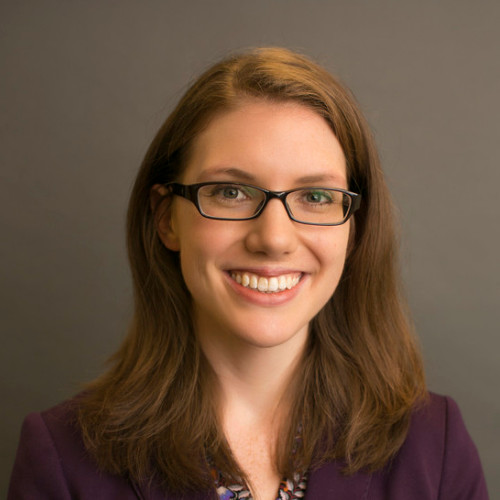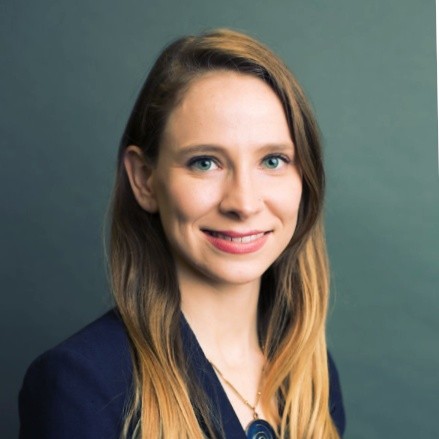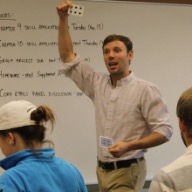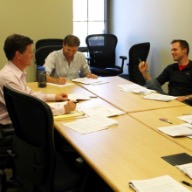A Day in the Life of a Ph.D. Student
Doctoral training is a demanding yet rewarding experience, and no two students’ paths look alike. The accounts below illustrate how VCU Ph.D. candidates in management balance writing, teaching, research collaborations and personal routines. Each story highlights the flexibility of the program, the intensity of the work and the passion that drives our students to succeed.
 Imran Kadolkar
Imran Kadolkar
Ph.D. Business - Management, 2025
Placement: Ball State University
Imran’s days reflected focus and curiosity, shaped by early research meetings, coding sessions and late nights spent writing. Between advising discussions, AI and language processing projects and walks along the James River, his story captures the persistence and genuine enjoyment that defined his Ph.D. experience at VCU Business.
Read below.
A typical day as a fourth-year Ph.D. student at the VCU School of Business
By Imran Kadolkar
This is my account of a typical day as a fourth-year Ph.D. student, someone working towards his dissertation defense, having survived (or rather enjoyed) the coursework (i.e., a set of preliminary courses one needs to take to understand different management domains) and comprehensive exam (which tests your understanding of these domains). Of course, the general experience varies from day to day, but my account should give you a brief insight into the life of a Ph.D. student.
Waking up even as late as 9 AM (early for me) feels like a punishment. Yet, Jose, one of my Ph.D. advisors, happens to be an early morning person (clearly a match made in heaven). Thus, I’m forced to wake up at 8 AM, cook meals (including lunch and dinner), and prepare for our 9 AM Zoom meeting, which lasts about an hour. I often joke with Jose that on those happy occasions when I don’t have to wake at 8 AM, I’m waking up by the time he’s finished working for the day. Yet, hard work paid off. My project with Jose and other Ph.D. students was recently published in the Journal of Management (JOM), one of the prestigious journals in our field.
Directly after the Zoom call with Jose, I follow up on everything we discussed. I often collaborate with him for projects involving natural language processing (NLP) and simulations, which means I have to read multiple articles from computer science and statistics (i.e., non-management domains). Apart from the JOM publication, I have another article under revision at Organizational Research Methods on sentiment analysis in organizational research. I spend about 90 minutes until 11:30 AM reading some newly published literature on NLP, writing code, running simulations, and analyzing the results.
Then I prepare for my Strategic Management class, which starts in a bit more than an hour. My school is about a 30-minute walk from my apartment. I leave at approximately 11:30 AM and reach my office around noon. I share a large office space with three other Ph.D. students. Having all four of us present at the same time is a rarity (due to different teaching and work schedules). However, I still meet a few students, chat for about 10 minutes, and prepare for my class. My class runs from 12:30 to 1:45 PM. After class, I am having lunch.
At about 2:30 PM, I barge unceremoniously into the office of Sven, my other main advisor, whom I “forced” to work on an artificial intelligence (AI)-related project with me. Indeed, I am currently working on multiple research projects with him. Apart from the 9 AM to 10 AM time slot, these next one to two hours are my most productive. My meeting with Sven is less of a one-way monologue (i.e., Sven telling me what needs to be done) and more of a dialogue and debate (but again, that’s the Ph.D. experience). As I always tell Sven, “I always leave your office much more knowledgeable than when I entered, only to go home, ruminate over the discussion, read articles, and then realize that I know absolutely nothing about the topic.” Sven typically smiles and replies with the adage “The more you know, the more you realize that you don’t know much at all,” and the process repeats. However, I won’t complain. This and many other “intense” discussions with Sven resulted in a publication about the use of AI to manage a workforce in the gig economy in the Journal of Organization Behavior, which is very special to me because it is my first publication as first author while still being a Ph.D. student.
I usually leave Sven’s office at 4 PM and reach my apartment at around 4:30 PM. I take a break, drink tea and relax a little. After about an hour I walk to the James River Park area, a beautiful, picturesque location close to VCU. During my walk, I try not to think about my research (but often fail). I spend about 60 minutes walking and return home. The rest of my day, until 1 AM (and sometimes 2 AM), involves ruminating over the discussion with Sven, reading relevant articles, making notes, and working on my dissertation. Every day, I dedicate at least one hour to writing (including my research projects and dissertation). If I wasn’t able to do this earlier during the day, I do it at the end. Finally, I go to bed at around 1 AM or 2 AM drained and tired from the day but excited to start enjoying my next day.
My time at VCU was the most satisfying experience of my life, both academically and personally. Academia is fun when you truly enjoy it. I’m deeply passionate about the topics I research, including AI applications in management and NLP. Yet, what makes this passion translate into reality is the constant efforts from my two advisors, Sven and Jose, who have worked just as hard as I have to ensure that I stay on course to receive my degree, publish papers, and secure a good job.
 Kate Keeler
Kate Keeler
Ph.D. Business - Management, 2019
Placement: The Ohio State University
Kate’s first year in the program was defined by an early morning routine, daily writing discipline and long commutes from Fredericksburg. Her story reflects the persistence required to balance coursework, research projects and teaching responsibilities, while still finding fulfillment in the rigor of doctoral training.
Read below.
My typical day as a Ph.D. Candidate in the Department of Management and Entrepreneurship at VCU
By Kate Keeler
This account is of a typical day I experienced during my first year at VCU. But first, some context is warranted. My experience is unique in that, prior to my acceptance into the doctoral program at VCU, I had completed my coursework and passed my comprehensive exams for a PhD in Industrial/Organizational Psychology at George Mason University. My advisor, Jose, selfishly changed jobs without consulting his graduate students first, so as punishment I followed him to VCU (he thought he could be rid of us—ha!). Not wanting to give up my life (i.e., my dogs and my husband) in Fairfax, I lived with my parents during the week. They lived in Fredericksburg, which is an hour from Richmond. Thus, a good part of my day consists of driving (two hours roundtrip). With that caveat in mind (I strongly recommend living as close to campus as possible), here is my typical day.
I’m a morning person, so I wake up at about 5 AM. I also like avoiding traffic, so I leave my parents’ house by 6 AM. This puts my arrival on campus close to 7 AM. During the drive, I typically think about what I want to accomplish that day and listen to an audio book. Once on campus, I sit in front of my computer and I write. I write every day during the week for two hours (7-9 AM). This doesn’t mean that I don’t do any other writing or research for thje rest of the day; but I always do it during this time in the morning, so that no matter what happens, some writing has gotten done. This morning, I work on a first-author paper that received a second revise and resubmit (R&R) from Academy of Management Review. The paper is a theoretical account of how different characteristics of music influence employee performance. The paper was eventually accepted for publication.
After my designated writing period is over, I then work on other projects. I have another R&R for a first-author paper that is a meta-analysis on situational strength interactions. This paper was eventually accepted for publication at the Journal of Applied Psychology. I focus on writing the response letter to the reviewers and updating the introduction to address the reviewers’ feedback. I work on that for another two hours or so.
At this point, I probably take a brief break for 10-15 minutes by reading the news, texting my husband, chatting with office mates, and getting some coffee. At 11:30, I have a meeting with Chris, who I’m assigned to as an RA for the academic year. We’re working on a project examining how employees’ experiences of daily hassles leads to greater engagement in deviant behaviors at work and how mindfulness acts a buffer that reduces these negative effects. I also help run the undergraduate lab that Chris organized. We have a lab study and a field study going on simultaneously, so we discuss in our meeting the various tasks that we need the undergrads to do. I take notes and prepare to draft an email to the lab outlining the tasks for the week.
The meeting lasts for about 90 minutes, after which I eat lunch and then work a bit on my course work for my classes tomorrow. I’m taking two courses this semester: Strategic HR and SEM. For Strategic HR, we typically have 10-12 articles to read every week, and are required to lead the class discussion for the entire class period. From about 1 to 3 PM, I read a couple of the assigned papers and take notes. I’m not leading tomorrow’s discussion, but we are required twice during the semester to write mini research proposals based on the reading. I start to outline my ideas for a research proposal while reading.
This semester I am a TA for my advisor for a 100+ section of MGMT 310. Generally, this means I help administer exams and meet with students to go over any content that they don’t understand and are too scared to ask Jose (I mean, just look at him…terrifying). I taught this course the previous semester. At 3 PM, I head off to the classroom. As usual, the class is pandemonium; the projector has exploded (likely because my advisor tried to turn it on) and students are running all over the place trying to escape. After the fire brigade has arrived and tamed the flames, class begins. [Advisor’s Note: Dr. Keeler has a penchant for hyperbole] I work on other stuff and nod my head at certain intervals to pretend that I’m paying attention. [Instructor’s note: Dr. Keeler was no better at it than were the undergrads]
After class, I continue to work on some other research projects. The three other doctoral students and I are working on a project with Jose on the reporting and interpretation of reliability indices in our field. These types of projects require that we systematically go through hundreds of papers and record certain information based on a coding rubric. This paper is currently under review at the Journal of Applied Psychology a second time after receiving an R&R. Coding for the reliability project takes about two hours. After that, I then begin coding papers for a meta-analysis that I’m leading on climate strength. This takes about another two hours, during which I eat my dinner that I brought with me. On the weekends, I make all my food (and husband’s, otherwise he’d starve) for the week. This saved me a lot of time and money.
By now it’s 8:30 PM. I usually try to leave campus by 9 PM, so I work on some quick tasks like answering emails. I’m back on the road by around 9 PM and get back to my parent’s house by 10 PM. On the drive home, I chat with my husband. Once back at my parents’ house, I chat with them for a bit and then either read one more article for my class tomorrow or do some of the homework problems for SEM. I then go to bed between 11-11:30 PM.
Yes, this schedule was intense. On the weekends, I had a less intense schedule and focused on doing things with my family. And, in case you’re wondering, yes, it was more intense than my typical day in my other PhD program. Nevertheless, joining the program at VCU was the best decision I could have made. I’ve had, by other people’s standards, “great” applied research jobs, where I only worked 8 hours a day. Yet, I would come home feeling exhausted and drained. More so than I had ever felt at my toughest day in graduate school. In fact, most of the time I didn’t feel completely drained of energy. I was tired, sure, but still highly engaged and excited about my work.
Epilogue from Dr. Keeler’s advisor, Dr. Cortina:
Being successful in a PhD program isn’t about being the smartest person in the program; it is about being the most persistent. Nothing about it is easy. If it were, then everybody would get one. But, if you can stick with it and can overcome those challenging moments, I can say without a doubt that you end up with one of the most rewarding careers imaginable.
[Advisor’s note: For all her kvetching, Dr. Keeler landed one of the best faculty job that year, which was at the Fisher School of Business at Ohio State University]
 Sheila Keener
Sheila Keener
Ph.D. Business - Management, 2019
Placement: Old Dominion University
Sheila’s experience highlights the transition after completing coursework, when much of her time is devoted to research and teaching. Her story shows how flexibility, classroom engagement and collaboration with peers shape the rhythms of life as a doctoral student.
Read below.
My typical day as a Ph.D. Candidate in the Department of Management and Entrepreneurship at VCU
By Sheila Keener
In the following paragraphs, I’ve included a description of my typical day as a 3rd year student at VCU. I’ve passed my comprehensive exams (meaning my course-work portion of the program is over), so my days are devoted to research (especially my dissertation) and teaching.
I’m definitely not an early morning person, so most mornings I don’t wake up until about 7:45. The first thing I do when I wake up is make coffee. While the coffee is brewing, I have Google remind me of what is on my calendar, tell me the weather, and read me news highlights while I check my email. As soon as the coffee is finished brewing, I pour myself a cup (and down it in about 5 minutes). After pouring myself a second cup, I get settled and do some reading. Today, I’m reading articles related to my dissertation.
Around 9:40, I head to campus. I live about 15 minutes away from campus, so, by 10:00, I’ve gotten to my office. Once I’m there, I head upstairs to have a quick meeting with my dissertation chair to discuss progress that I’ve made on my dissertation. We also touch base about a few other research projects we’ve been working on. We work for about an hour.
By 11:00, I’m back in my office. This year, I teach MGMT 310 (Managing People in Organizations) and have my office hours from 11:00 – 12:15. Most of the time, students don’t actually stop by, so I usually have this time to review my notes for that day’s class, do any outstanding grading that needs to be done, and eat my lunch. Today, I spend this time grading team assignments my students worked on in class last week.
At 12:15, I stop by the faculty lounge to get another cup of coffee, and then I walk down the hall to the classroom I teach in this semester. Once I’m in the room, I put some music on for the class and spend a few minutes checking in with my students (I have 30 this semester). I’ve found that students are more likely to participate in class if you can get them talking before class starts. Today we’re doing a case study, so participation is extra important. Once class starts, we spend the next hour and 15 minutes (from 12:30 to 1:45) discussing the case and connecting it to the rest of the topics from that week’s readings. Today’s discussion actually went pretty well (admittedly, this does not always happen!).
After class, I head back to my office and enjoy a much needed 15-minute break. I usually skim through some news articles, check my email, text my husband to see how his day is going and/or chat with my office mates. At 2:00, I meet with two other doctoral students with whom I am working on a project. We spend the next hour developing a coding sheet, locating articles to code, and dividing up the articles to start the coding process.
At 3:00, I’m back in my office. I share an office with four other doctoral students. Occasionally, all five of us are in the office. I’m easily distracted, so, if everyone is in the office, I tend to head home and work there for the rest of the day. However, today, like most days, there are only three of us there – me and two fellow students. The three of us are usually pretty quiet, so I’m confident I’ll still be able to get work done if I stay in the office. For the next several hours, I work on research-related activities. Today, I’m working on creating tables for a project on publication bias. All the data analysis for the project is done, but I still have about 200 tables to create (at least it feels that way!).
At 6:30, I head to the gym. By 8:45, I’ve gotten back from the gym, showered, and eaten dinner with my husband (we both go to the gym late on Tuesdays and Thursdays, so Monday and Wednesday nights, we always make extra so we can eat leftovers and don’t have to cook after we get back from the gym). At 9:00, I’m ready to do more work. Tonight, I’m working on data analysis for another research project (which currently has an R&R at the Journal of Applied Psychology). When I need a break from that, I read some articles that I’m reviewing for a conference.
By about midnight, I’m starting to wind down for the day. I make a list of everything I want to accomplish the following day, get my clothes ready for the next day, and go to bed.
I should note that although this is a typical teaching day for me, a lot of my days are atypical. If my students had an exam or big assignment due, I spend more time during the day grading. If I’m getting ready to submit a paper to a journal or have an upcoming deadline, I’m up until 2:00 or 3:00 AM working. If I’ve been feeling worn down and have been having trouble focusing, I try to get to bed a little earlier than usual. It’s important to stay flexible!
In case you are wondering, this was pretty much my routine before my comprehensive exams as well. The only difference was that I spent some of the time I currently spend on research in class and doing class assignments. This may sound like an intense schedule, but I love what I do and have great colleagues, so, most days it’s actually enjoyable and rewarding!
 Andrew Bennett
Andrew Bennett
Ph.D. Business - Management, 2015
Placement: Old Dominion University
Andrew emphasizes the flexibility of the program and the importance of managing time effectively. His story shows how teaching, seminars, research projects and personal routines intersect, illustrating the dynamic balance that defines doctoral life.
Read below.
A typical day of a Ph.D. in Business student at VCU
By Andrew Bennett
Here’s a brief sketch of my “typical” day as a 2nd year Ph.D. student – keeping in mind that there is no such thing as a typical day or a typical Ph.D. student. The great part of the Ph.D. program at VCU is that I have a lot of flexibility with my time (which of course is a problem if I don’t manage it well enough to get everything done). So, here it goes…
I’m a morning person, meaning I start my day around 6am. I try to exercise in the morning, so I run, swim, or go to the gym early in the day. After a shower, breakfast, and a quick e-mail check, I walk to the Starbucks near my apartment. By now it’s around 7:45am, so I grab a drink and settle into a table for a few hours of reading – usually something for class or my own research. (In case you’re wondering, we typically read between 8 and 12 journal articles each week for each of the three courses, so roughly 200-400 pages per class).
 Around 10:30am I leave Starbucks and drive to VCU. I live close to campus, so I’m in my office by 10:45am and start preparing for the course that I teach this semester, Management 319: Organizational Behavior. I review my slides (which I created during the summer), make notes of my own work experiences to share, write down a few questions to ask the class and hopefully spark a discussion, and also review the activity I have planned for that day about goal setting. My section of MGMT 319 is 50 minutes long, 3 days a week, with 48 students. Today’s class goes well, with students really enjoying the demonstration of how their fellow students perform to the different goals that I set for them. I make a note to keep this activity for future semesters, chat with a few students after class, and am back in my office around 1pm.
Around 10:30am I leave Starbucks and drive to VCU. I live close to campus, so I’m in my office by 10:45am and start preparing for the course that I teach this semester, Management 319: Organizational Behavior. I review my slides (which I created during the summer), make notes of my own work experiences to share, write down a few questions to ask the class and hopefully spark a discussion, and also review the activity I have planned for that day about goal setting. My section of MGMT 319 is 50 minutes long, 3 days a week, with 48 students. Today’s class goes well, with students really enjoying the demonstration of how their fellow students perform to the different goals that I set for them. I make a note to keep this activity for future semesters, chat with a few students after class, and am back in my office around 1pm.
I spend the next hour eating lunch, responding to school e-mails, responding to personal e-mails (and checking Facebook, espn.com, and a few news websites), and reviewing my notes before class at 2pm. The next three hours are spent in a Ph.D. seminar, where we discuss as a class (there’s 4 of us) the key topics as well as what we liked and what we would improve in the research going forward. Typically one student is the discussion leader for each class, meaning they’ll organize the readings and write a list of questions to keep the discussion flowing.
 At 5pm I have a research meeting with a faculty member to discuss our ongoing project examining recovery experiences at work. We ended up finding that reduces fatigue to a greater degree than do other recovery-related behaviors. That paper was recently published in the Journal of Organizational Behavior (https://doi.org/10.1002/job.2217). Anyway, that meeting lasts for a little over an hour, so afterwards I drive to a restaurant and meet my girlfriend for dinner. I’m home by about 8:30pm, so I usually take about an hour or so to catch up on e-mails, course readings, or some other work that I feel I should have finished. Following that, I watch TV or read something for fun (usually fiction), and go to bed.
At 5pm I have a research meeting with a faculty member to discuss our ongoing project examining recovery experiences at work. We ended up finding that reduces fatigue to a greater degree than do other recovery-related behaviors. That paper was recently published in the Journal of Organizational Behavior (https://doi.org/10.1002/job.2217). Anyway, that meeting lasts for a little over an hour, so afterwards I drive to a restaurant and meet my girlfriend for dinner. I’m home by about 8:30pm, so I usually take about an hour or so to catch up on e-mails, course readings, or some other work that I feel I should have finished. Following that, I watch TV or read something for fun (usually fiction), and go to bed.
In a nutshell, that’s a normal day. Of course there are multiple weeks each semester when you work much more than 40-50 hours, such as putting in 80-100 hours to finish your eleventh version of a paper before submitting it to a scientific journal. Even though some weeks are grueling, it’s an enjoyable process for me because I believe what I’m working on is important from both a practical and academic standpoint. I’m also passionate about my interest areas, so a longer week is still enjoyable because I’m spending time with other Ph.D. students who are interested in similar topics and all going through the program together.